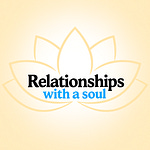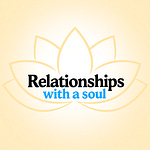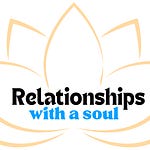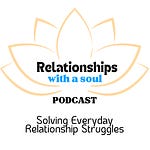Welcome to The Relationships With A Soul Podcast
Every Tuesday, I do a deep dive on a common relationship problem that more than likely, we’ve all experienced at one point or another. And some of us, are actively in these situations right now, which makes these episodes great support systems for you as you push through this problem and arrive on the other side. From observing human behavior over the last 15 years, I’ve seen a lot of the same relationship problems come up again and again. Those will be the ma in ones that we focus on here.
It is my goal that these episodes help you understand yourself better, as well as your relationships. Armed with this new info, you’ll be able to create stronger relationship dynamics with ALL your connections. Trust me, strong connections are worth more than anything money can buy. Once you understand the magic of just one of these connections, you’ll become obsessed. Now let’s get into today’s episode!
Episode 32: Why Degrees Don’t Equal True Credibility
I felt compelled this afternoon to do an impromptu piece on why credibility and credentials—specifically degrees, masters, and PhDs—most likely do not reflect the credibility that most people think they do in the world of therapy, coaching, and self-development. I realize that this can be triggering for some people because it takes quite a bit of time and investment to get these certifications so you can earn the trust of people and prove to them that you're worthy of helping them
But if you're daring and you're willing to stick with me in this episode, I'm going to break down why I don't believe that this type of credibility is exactly what you think it is. I don't really agree that it should be weighted as highly as it is in today's mainstream society. So I'm going to break that down for you, and hopefully, by the end of this episode, you'll have a new perspective on what credibility actually means, what credentials are actually valuable, and the right questions to ask someone that your considering to hire for help in the mental health / coaching space.
I want to start by saying that people get degrees, and they get this credibility from years of schooling at universities. Some of the universities are prestigious, some of them are just normal universities. Going to a prestigious university doesn't guarantee that you'll actually learn something, and it sure doesn't guarantee that you're going to apply that knowledge in the future. That's up to you. That's up to whether you’ve correctly processed what you’ve learned and applied the knowledge to your life. There’s a lot of things in life that can get in the way of processing information properly anddoing the real work. This gets people stuck from taking the required action in their lives to “walk the talk” and live what they have learned. Avoiding emotions and feelings can stop you, losing someone close to you can stop you, trauma and abuse can stop you, basically any heavy situations that life throws at you can stop you. It doesn't really matter what you know, or have learned. What matters is what you have processed and applied. Can you handle the punches that life throws at you and work through them properly so that you can fully understand, live, and teach all that you have learned.
When it comes to school, I find the schooling system that dishes out degrees to be incredibly interesting. Let’s take a closer look at what you’re really doing while at these schools. You're going to school, you're sitting in a classroom, and you're listening to professors who have read books by famous psychologists—They’ve watched documentaries, and basically sifted through a history of psychological works that have been proven to be credible. These professors then come up with the conclusion that they understand how the human psyche works once they’ve read or watched a bunch of material, and maybe even conducted a few experiments. The more advanced education programs offer even more experiments and trials done to test data effectively. And the really advanced ones will actually require you to put yourself in the fire for a limited time and practice going through deep emotional experiences to better understand how the human psyche works.
Fast forward to most professors teaching in front of a class — what they're doing at the front of that classroom is more often than not, just regurgitating what they’ve read, but they’re not actually living what’s coming out of their mouths by applying it to their lives.
There’s a whole new level of intelligence and experience that’s required to take advanced knowledge and put it into action, and there’s also a whole different teaching process that unlocks that ability and makes it possible. We’ll go into that in a moment.
The real question is: — what is stopping you from acquiring that same knowledge that these professors are regurgitating in school? You can buy those books, you can watch those documentaries, and you can read those manuscripts. You can do all of that work now with the internet on your own. And for the incredibly rare stuff, you can subscribe to online libraries for a fraction of the cost of attending the university. Instead, most people pay the high education fees because they just don’t know any better, or don’t trust themselves.
You don't need to go to a classroom. Some people need that structure to learn in that environment, but it's not necessary. You can actually devote years of your life to studying that information on your own. Some people may prefer the human connection to build relationships on campus, but there’s also a high possibility that these relationships will turn long distance after the school year has concluded and their strength will weaken over time. It’s worth thinking about.
I think we all know that no matter how many books you read, that doesn't necessarily mean that you're going to be applying that knowledge and improving your life from it. You can learn as much as you want, but if you don't apply it to your life, it doesn't matter what's in your head. What matters are the actions that you take given what you know.
Going back to what I touched on earlier, the real deep inner work that is required to process all of it, begins with your own personal history from childhood to adulthood.
Being able to heal your own wounds, come to terms with them, and let them go is one of the most difficult practices, and there is no school that guarantees that work will be don at the end of the curriculum
And this is the step that's difficult for most people to accept. It's easy to read a book, it's easy to take quotes and information from famous reputable people. It's difficult to take action and use it in a way that changes things up for you and invites a whirwind of discomfort. If you’re able to stay in this storm, eventually this work purifies you so that you can then guide others in the best way possible. Going through your own struggles and truly coming out on the other side, is the difference between a real teacher and someone acting the role on stage.
What does doing the deep inner work look like? It requires you to sit with yourself, to sit with your emotions, to sit with your thoughts, to sit with your feelings, and allow them to happen so that you can learn more about the inner workings of your mind and psyche. Instead of saying to yourself, “This feeling shouldn’t be happening right now”, you should lean into it so it becomes “This is exactly what I’m supposed to be feeling right now.” Once you get there, you ask yourself, “Why is this feeling coming up for me and when did it first come up for me in my life”. This is how you uncover the buried experiences that created blockages in your human experience. Working through these experiences slowly and carefully is what will allow you to understand the real human version of yourself. You can then fully understand and apply what the book, documentaries, and data experiments have taught you. It requires you to do the hard stuff — to feel the feelings, using some form of meditation or reflecting to gain clarity—It requires you to live a full life experience completely open and vulnerable, and then you begin to analyze how your life actually is, and what is unfolding in it.
My acting teacher used to say: “You must be fully open and available to be done to”. What he meant was that you needed to be as open and vulnerable as possible so that the words and actions of the other actor could pass through you and affect you in the most authentic way possible. Life is no different. We’re all actors on a stage, and we’re all experts at acting, especially when we’re not thinking about it.
That is the only way that you can completely learn about yourself—By being willing to feel everything. When you learn about yourself in this way, you will begin to understand how others work as well—You can fully learn about humans and the human experience in general — by first exploring it authentically through yourself.
There's a lot of people out there that believe that we're all one, and we’re all connected. I believe that there's a massive amount of truth to that. Which means that if something is happening for you, it's probably happening for someone else or has happened for them in their lifetime. By allowing yourself to fully have your experience and feel it all, you’ll be able to have real empathy and compassion for others who are going through similar situations.
And so the majority of professors and credited psychologists, PhDs, Masters — you name it — they haven't actually done this work and gone through the trenches themselves. Instead, they studied from people like Carl Jung and other well-known psychologists. And now that they have a piece of paper on the wall of their office, they're quote "accredited," and people just believe that, because they believe and trust in the schooling system. They believe that school wouldn't steer you wrong.
But there are a lot of flaws in the schooling system when looked at closely. School is not the best way to learn how to do something effectively — just like the news isn't the best way to get information. Just believing something at face value is not the best way to discover the truth in life. And when we start to explore deeper messages, we start to learn that, we start to see that. School limits you to what you can be taught, because it chooses what to teach you. The same with the news. You’re only told what they want you to hear. What about all the other knowledge out there that isn’t getting to you? What about all the other stories that you’re missing out on?
And so yes, I do believe the schooling system is broken. A lot of people do — and it’s starting to become more widely recognized.
But here’s why people still cling to the idea of a degree: it feels like proof that someone has studied great thinkers like Carl Jung.
But pause for a second and ask: Who did Carl Jung study with? Jung was deeply influenced by names like Freud, Goethe, and Nietzsche. And if you keep tracing that line of influence backward, you eventually discover that at the very root, real learning doesn’t come from institutions or credentials.
It comes from the raw act of sitting with yourself — feeling your emotions, wrestling with your thoughts, writing, speaking out loud, and deeply exploring life through your own experience.
In the end, the quote “teacher” who taught everyone was just another human being, bravely exploring the inner workings of the world. That’s it.
That's what ultimate credibility looks like — someone who's willing to go there, who's willing to do it differently, to experiment, sit with, and work through the difficult stuff.
How can you tell if someone has and is currently applying that kind of work to their lives? Observe how they’re actually living. Do they seem grounded? Balanced? Are they overweight or taking good care of themselves? Are they using substances or crutches? Hows their attitude? Are they easily offended? Relaxed? Accepting of your decisions and opinions regardless if you agree with them or not? This type of analysis will tell you if they have a lot of imbalances currently in their lives. If they do, it means they still have a lot of work to do. Of course, no one is perfect, and we’re not going for perfection here. These are just tools you can use to find out if the person helping you is the right person for you or not. Most people want authenticity. This is a great way to sniff that out. It’s easy to hide behind a degree. It’s harder to fake actually living that in the world, especially for the longterm. A person’s raw character really is their greatest achievement.
What happens if you hire and agree to work with someone who is heavily imbalanced and not walking the path they’ve been accredited for? You’ll notice they listen to your problems and they regurgitate psychological information from a textbook to help you. Information that they themselves are not living due to blockages in their life.
During a session, they make you feel better for a day, maybe a week, and then as time goes on, you realize that nothing has really changed. You have the same therapist for five to ten years, and you pay them tens or even hundreds of thousands of dollars, and in the end, you look at all of that and you realize that the needle really hasn’t moved for you.
And why is that? It's because the person teaching you hasn't completely done the work themselves. They’ve just convinced you that they did with a piece of paper and credibility.
And so if they haven't done the work themselves, they can't actually teach you how to do the work, and you won’t get the result you want because if they can’t achieve it themselves, its almost impossible for them to guide you through something they haven’t truly experienced.
So what they're doing is essentially leading you astray. And it's not really your fault. You trusted them, you trusted the system, you followed the path that everyone stands behind. But if you’re not getting the results you want, It’s time to look at things differently, and we’ve already tapped in on a few ways on how to do that.
I want to mention that there are some people who have the degree, who have also done the work and applied it to their lives. These people are incredibly rare in my experience, but they do exist.
If you find these kinds of people, they can really help you. They take time to dig into the patterns of their own lives, the patterns of their emotions, they’re willing to go there to understand the human psyche, to run experiments through trial and error, and to record their findings. This is the deep work that is truly required to understand human behavior, so you can help guide other people effectively. Carl Jung is the perfect example of this type of learning process. It’s why people admire his work so much.
Also, I feel the need to mention there are people with absolutely no credentials whatsoever who have also done this type of work I describe above and applied it to their lives. This is pretty rare as well.
In my opinion, those people are just as valuable as the people with the plaque.
Because in the end, what really matters is how much time you put in to do the experiments, to learn about yourself, to work through your emotional problems and baggage and trauma, so that you develop a system on your own to help people do the same thing. If you can heal it for yourself and live that new example, you can guide others to do it as well. Also, the energy that you emit from your newfound healed self, will transfer to anyone you’re helping and further inspire them to keep going. Your energy will solidify that proof for them that this type of change is possible.
Nobody's perfect, and we don't expect anyone to be. But if you're living with a lot of imbalances after all of these certifications and credibility, have you really worked through your stuff, or have you just convinced yourself that you have?
And so a person's greatest asset in this world is the way that they live their life — the balance behind who they are, the energy that they emit out into the world, the ability to have empathy and compassion for their fellow humans, and to be willing to explain things to them in a patient manner, as well as listen to them in a way that reflects their level of patience.
Someone that has developed a process to work through their own personal emotional struggles so that they can genuinely help other people do the same.
This is what I consider to be the most valuable credential in the healing and coaching space.
So the next time you come across somebody who doesn't have a degree or who doesn't have the credentials that you think you're looking for, instead of focusing on the fact that they don't have those, ask them instead:
What kinds of difficult emotional experiences have you been through in your life and overcome?
How did you come transcend those difficult emotional events?
What's the difference between the person you used to be and the person you are now after doing this kind of work?
Do you have a daily practice now that helps you work through challenges when they come up? (this last question is here because it’s important to know if the teacher is still actively practicing and learning)
The journey never really stops and a teacher who recognizes this and is still actively practicing the work and willing to learn new things, ranks in the exceptional category in my book
If you start asking someone those questions, you're absolutely going to begin to realize if they're for real or not, if they can help you, and if they actually have done the work.
I hope this information has helped illuminate a few new pathways in your brain to explore. If you learned something or found this insightful, please give it a like so Substack will show it to more people.
As always, if you need clarification on anything or have additional questions, my door and DMS are always open. You can also visit my website by clicking the photo below. Substack subscribers get 20% off all my services for a limited time. DM me to get that discount.
THANK YOU for tuning in, supporting my work, and taking this journey with me to becoming a better you. Self-Growth is one of the best things we can gift ourselves with in this lifetime and I am honored that you recognize this podcast can and will help you do just that. Please feel free to leave a comment on what you thought of this episode. You’re welcome to share any struggles that you’re going through of clarification needed to better understand the episode. I respond to all comments and care about your opinions and experiences.
I’ll see you all next Tuesday where we will explore another common relationship problem and how to best approach it!
A happy week to you all!
Not subscribed? Subscribe now to get this podcast and many more self-growth info delivered right to your inbox!












